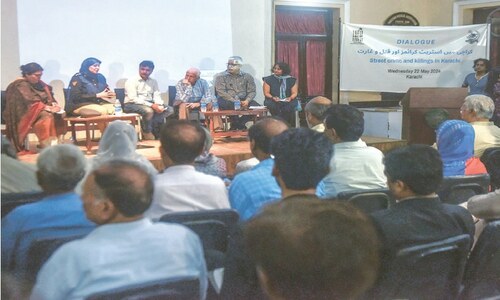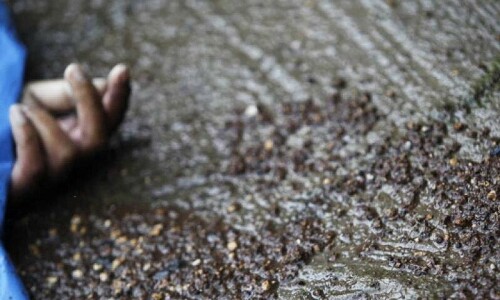KARACHI: The majority of communities living in the Indus delta are extremely vulnerable to climate change-induced disasters especially cyclones and coastal flooding. Additionally, the adverse impacts of climate change on women food producers associated with agriculture and fisheries sectors are comparatively high.
This was stated by speakers during a seminar — ‘Fostering coastal climate resilience and empowering women food producers in the coastal areas’ — organised by World Wide Fund for Nature-Pakistan (WWF-P) in collaboration with Oxfam in Pakistan at the International Centre for Chemical and Biological Sciences (ICCBS), Karachi University.
Speaking at the event, Dr Shireen Mustafa Narejo, the provincial secretary planning and development, highlighted the challenges deltaic communities faced in Keti Bandar and Kharo Chan and said some of their pressing issues could be addressed if sufficient fresh water downstream Kotri was available.
The annual cost of degradation of Indus delta is estimated at over $2bn
“Fresh water downstream Kotri should not be considered waste as it is essential for local communities and the ecosystem,” she noted.
She was of the view that the issue of pollution could be effectively tackled by discouraging consumer culture.
Vulnerable Indus delta
Talking about the government’s commitment towards poverty alleviation, she shared that a poverty reduction programme was being implemented in 18 districts across the province. “The government is ready to work with institutions and organisations which come up with innovative ideas to address issues facing marginalised communities.”
Dr Tahir Rasheed, the WWF-P regional head for Sindh and Balochistan, said the Indus delta was the third most vulnerable delta to climate change globally and at a greater risk of degradation primarily due to significant reduction in river flows that had led to reduction in sediment deposition, seawater intrusion and land subsidence.
On the impact of climate change on marginalised communities particularly women, he said gender inequalities were embedded in our culture and social fabric.
“Women are more vulnerable to climate change also because they have limited representation in development planning. It is an undeniable fact that women stand on the front line of climate change vulnerabilities and their voice should be heard at the national and international levels,” he emphasized.
Seawater intrusion
Senior environmentalist Nasir Ali Panhwar said the delta was once fed by 17 freshwater channels throughout the year but now the water source had been reduced to just one.
“Presently, the delta gets river water flows only in the months of August and September. This pattern over the decades has allowed seawater to intrude into the delta over hundreds of kilometres and destroyed fertility of the delta that once was very productive in terms of fisheries and agriculture.”
According to Mr Panhwar, the cost of degradation of the Indus delta is over $2 billion per year, which has serious economic, environmental and social implications.
The limited flow of fresh water was causing environmental degradation and negatively impacting traditional livelihoods, survival and resilience patterns in the presence of high levels of social inequalities, he added.
Hamera Aisha, manager conservation at WWF-P, said the organisation was contributing towards mitigating the effects of climate change through several projects. “These efforts aim to improve the resilience of rural communities of Sindh and enhance their knowledge and skills to prepare for, adapt to and mitigate climate and disaster risks.”
Chief Conservator-Forests Riaz Ahmed Wagan, technical adviser at WWF-P Muhammad Moazzam Khan, Pakistan Meteorological Department director Abdul Qayyum Bhutto and Dr Muhammad Ismail Kumbhar representing Sindh Agriculture University Tandojam also spoke.
Published in Dawn, November 11th, 2020














































Dear visitor, the comments section is undergoing an overhaul and will return soon.